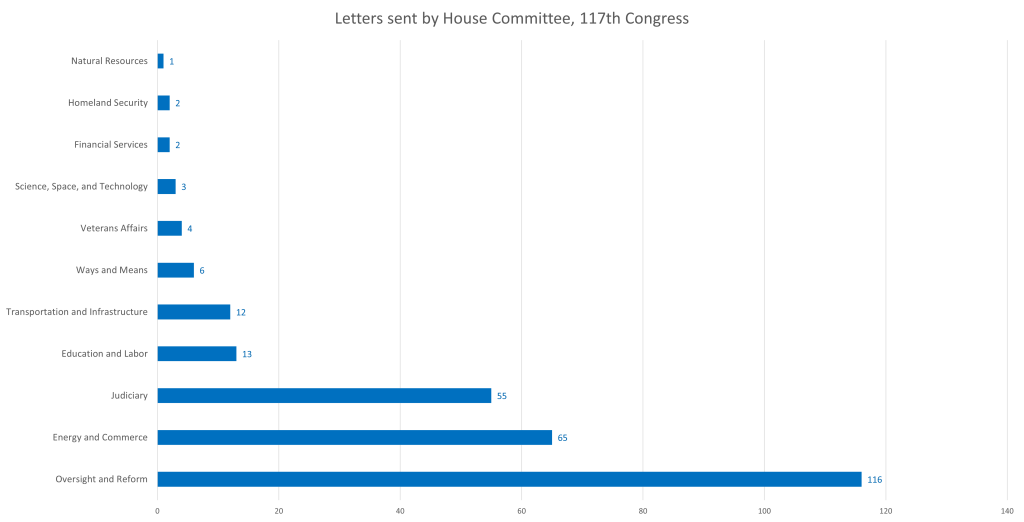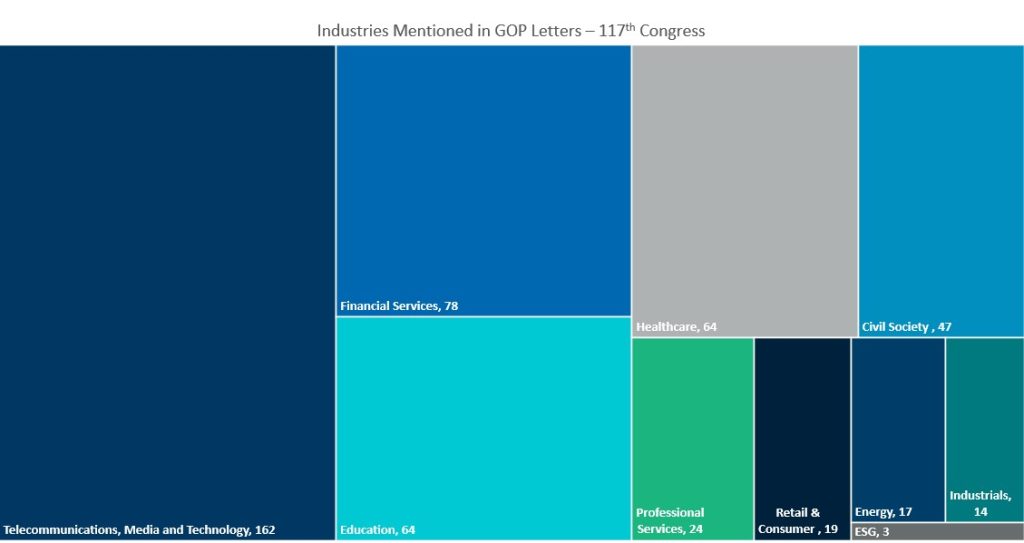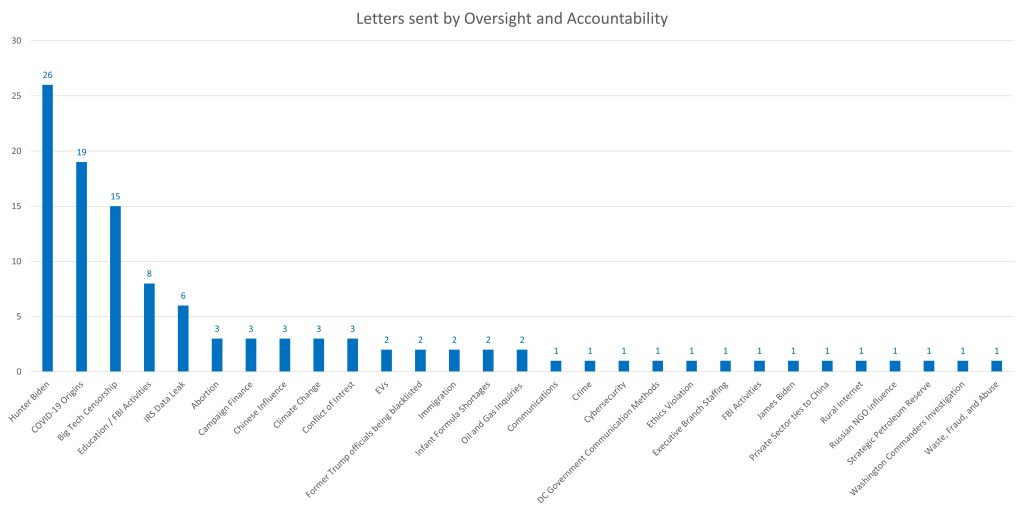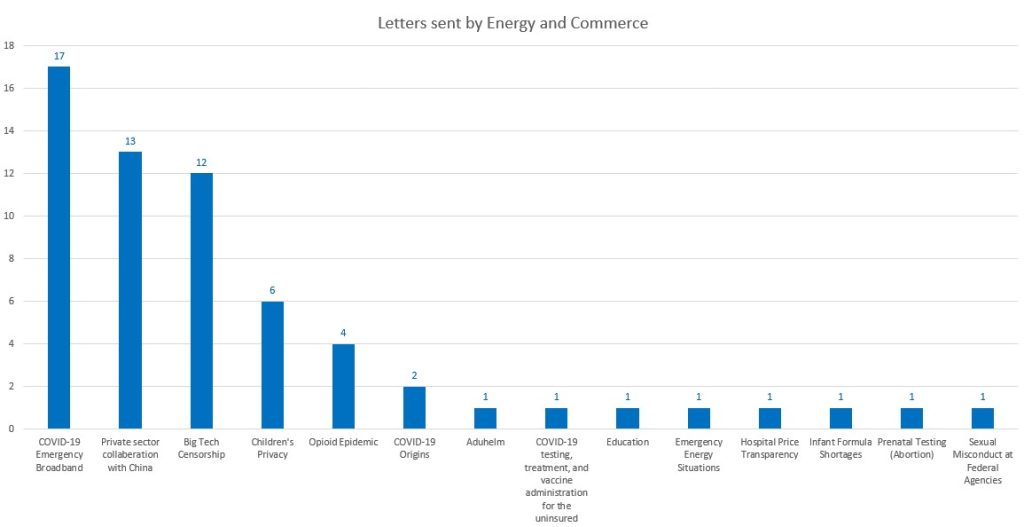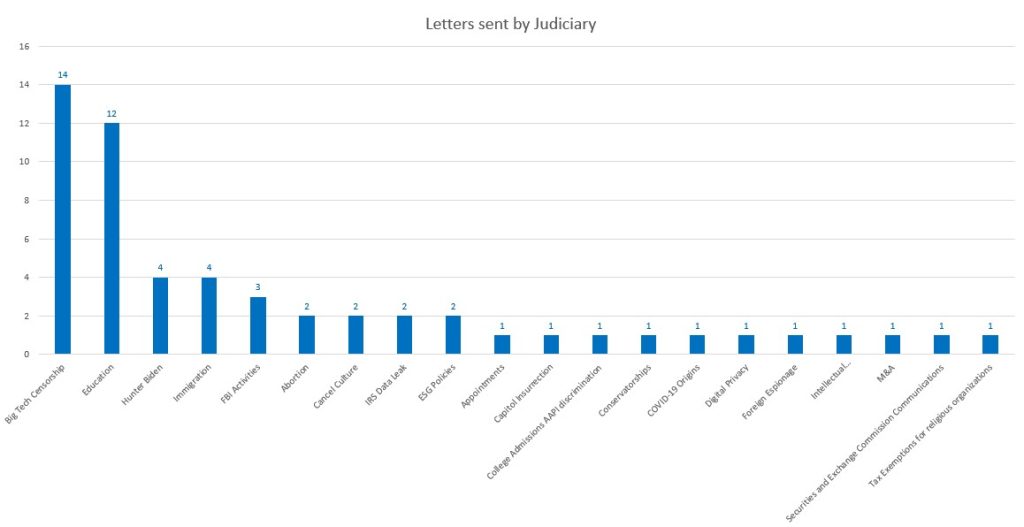House Republicans Waste Little Time, Push Forward on Investigations
For the past two years, House Republicans have issued hundreds of oversight letters to federal agencies and departments, individuals and private sector entities. Now, as members of the majority party, they are acting on those initial efforts and conducting widespread investigations. They have wasted no time scheduling hearings, sending out letters of inquiry, and even issuing subpoenas.
To predict which private entities may be targeted in the 118th Congress, we analyzed all letters sent by the Republican Party (a.k.a. “GOP”) members in the House during the 117th Congress, specifically those letters mentioning a company by name, and noting the policy focuses and signatories. The insights gained from this research have several use cases, ranging from predicting GOP oversight trends to notifying private sector entities that they could become a target of investigation or called to testify. While recent statements from the Biden Administration indicate that they do not intend to respond to letters sent while the Republicans were in the minority, companies mentioned by name should be cognizant of their status as an oversight target.[1] Further, the companies should take steps to protect their reputation and ensure that their business operations are not compromised by potential congressional investigations.
Technology, Education and Healthcare Among Top Industries Targeted for Investigations
Throughout the 117th Congress, House Republicans disproportionately targeted the technology, education, and healthcare industries in their oversight letters. As it relates to technology companies, congressional letters focused on censorship of conservatives by large technology firms, as well as alleged collaboration between the Biden Administration and Big Tech companies. On education, Republican leaders focused primarily on influence over school reopening plans and alleged collusion among school boards, higher education institutions, and the Biden Administration. In the healthcare sector, letters focused primarily on the pandemic’s origins, gain-of-function research, and immigration.
While it was a frequent talking point amongst Republican members in the 117th, the topic of Environment, Social and Governance (“ESG”) was underrepresented in oversight letters from the House. While lawmakers, such as Andy Barr (R-KY), have communicated their intent to target private entities, particularly investment banks that support ESG policies with the media and advocacy groups, this intention did not translate to an onslaught of letters from the House in the prior Congress.[2] Regardless, we do expect ESG to remain top of mind for GOP investigators in the 118th Congress.
Oversight and Accountability, Energy and Commerce, and Judiciary Committees Lead in Investigatory Efforts
Of the 282 letters sent by House Republicans that mentioned companies by name, 236 came from three committees: Oversight and Accountability, Energy and Commerce, and Judiciary. The Oversight and Accountability Committee, led by Representative James Comer (R-KY), sent 116 letters addressing a wide variety of policy areas but focused predominately on the origins of COVID-19, the influence of civil society organizations to impact school reopenings, the business dealings of Hunter Biden, and alleged Big Tech collaboration with the Biden Administration. (See Figure 1.)
The Energy and Commerce Committee, led by Representative Cathy McMorris Rodgers (R-WA), focused its oversight efforts in the 117th Congress on alleged Big Tech censorship, private sector collaboration with China, and COVID-19 emergency broadband. By far, the Energy and Commerce Committee was the most bipartisan of the group – sending 65 letters, 19 of which were bipartisan. Of the 19 bipartisan letters, 18 were focused on COVID-19 emergency broadband assistance. (See Figure 2.)
The Judiciary Committee, not traditionally known as an oversight powerhouse, led by Representative Jim Jordan (R-OH), also focused on Big Tech censorship, as well as education, immigration, and Hunter Biden. We expect this Congress’s Judiciary Committee to have an outsized role in providing oversight. (See Figure 3.)
Figure 1
Figure 2
Figure 3
House Rules Bolster Oversight Authority
The new House Rules package includes a number of elements underscoring Republican’s commitment to oversight. In the first instance, it significantly changes the mandate of the Select Subcommittee on the Coronavirus Crisis to reflect GOP frustration with the Biden Administration’s pandemic response.[3] It also establishes two new oversight committees; the Select Subcommittee on the Weaponization of the Federal Government and the Select Committee on the Strategic Competition between the United States and the Chinese Communist Party.[4] The Select Subcommittee on the Weaponization of the Federal Government is expected to leverage its subpoena power to investigate the operations of executive branch agencies.[5] In particular, alleged agency efforts to target Republican members and their voting base throughout the first two years of the Biden Administration will be under the microscope. The Select Committee on the Strategic Competition between the United States and the Chinese Communist Party is expected to focus on bipartisan concerns over Chinese espionage and U.S. economic competitiveness with China, as well as Chinese prominence in artificial intelligence, quantum computing, and energy storage, among other next generation technologies.[6]
How Should Private Companies Prepare for Investigation
Republicans, under the leadership of Speaker Kevin McCarthy (R-CA), are aggressively pursuing oversight targets in both the government and the private sector.[7] Companies receiving an inquiry in the prior Congress should consider themselves to be “on notice” and take steps to mitigate the reputational and legal threat posed by congressional investigations. These steps could include:
- Government affairs engagements to better understand and address congressional concerns,
- The creation of narrative documents that understand and are responsive to the criticism, and
- Engaging with third party validators to help shape public perceptions that are influencing congressional actors and the media.
For more insight on the public policy and political context, as well as discussing a response strategy, please contact us at O&[email protected].
[1] “White House to Jim Jordan, James Comer: Sorry, but you have to restart your oversight requests”, Politico (December 29, 2022), https://www.politico.com/news/2022/12/29/jim-jordan-james-comer-oversight-requests-00075710
[2] “Republicans Prepare to Ramp Up Their Anti-ESG Campaign in 2023”, Bloomberg Law (December 29, 2022), https://news.bloomberglaw.com/environment-and-energy/republicans-prepare-to-ramp-up-their-anti-esg-campaign-in-2023
[3] “Scalise on COVID Oversight: Republicans Will Hold Biden Administration Accountable,” House Committee on Oversight and Accountability (December 9, 2022), https://oversight.house.gov/release/scalise-on-covid-oversight-republicans-will-hold-biden-administration-accountable/.
[4] “How the House Republican New Rules Package Will Impact Companies”, Bloomberg Law (January 11, 2023), https://news.bloomberglaw.com/us-law-week/how-the-house-republican-new-rules-package-will-impact-companies
[5] “ICYMI: Stefanik on the Select Subcommittee on the Weaponization of the Federal Government: House Republicans Will Leave No Stone Unturned,” Congresswoman Elise Stefanik Press Release (January 31, 2023), https://stefanik.house.gov/press-releases?ID=C03C6B65-F2A5-4475-A335-63900AC9CDB4.
[6] “Chairman Gallagher outlines China committee’s agenda,” Roll Call (January 24, 2023), https://rollcall.com/2023/01/24/chairman-gallagher-outlines-china-committees-agenda/.
[7] “House Republicans target U.S. Chamber of Commerce as GOP battle against ‘woke capitalism’ revs up”, Fortune (November 27, 2022), https://fortune.com/2022/11/27/chamber-of-commerce-gop-crosshairs-republican-house-lawmakers-target-woke-capitalism/
The views expressed in this article are those of the author(s) and not necessarily the views of FTI Consulting, its management, its subsidiaries, its affiliates, or its other professionals.
©2023 FTI Consulting, Inc. All rights reserved. www.fticonsulting.com

